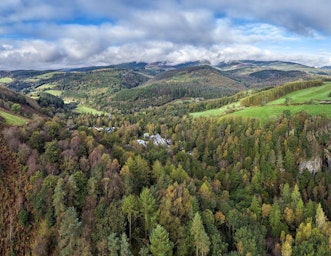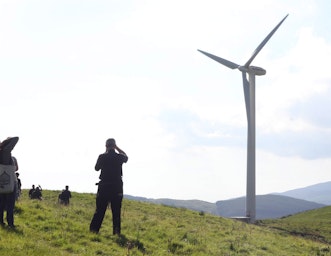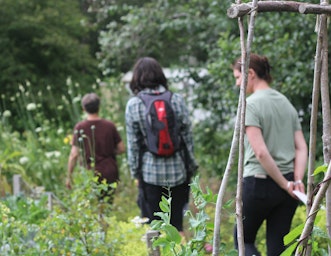
CAT Conversations: Rachel Calder, CAT graduate
September 26, 2024Home » CAT Conversations: Rachel Calder, CAT graduate
Rachel Calder studied Sustainable Food and Natural Resources at CAT from 2021 to 2023, exploring the role of mycorrhizal fungi in meadow restoration for her dissertation. We caught up with her to ask where her experience at CAT has led her and what impact her studies have had on her career.

Hi Rachel. What are you working on right now?
I’m doing a PhD looking at the impacts of elevated CO2 levels on mycorrhizal fungi and potential implications of this for woodland nutrient cycling. My research uses the Birmingham Institute of Forest Research (BIFoR) Free Air Carbon Dioxide Enrichment (FACE) experiment, which exposes sections of a mature oak woodland to increased CO2 levels throughout the growing season. A lot of uncertainty remains around the extent to which soil nutrient levels may limit tree growth as atmospheric CO2 increases. microbial helpers. The vast majority of land plant species form partnerships with mycorrhizal fungi. These fungi colonise plant roots and receive all the carbon they need directly from their plant host. In exchange for this carbon they can help the plant acquire water and nutrients from the soil and resist stresses like pests, pathogens and heavy metal toxicity. In addition to the benefits they provide directly to their plant hosts, mycorrhizal fungi play crucial roles in broader ecosystem functioning – for instance, they exert considerable influence over soil carbon sequestration.
What was the path that brought you here?
I’ve ended up where I am now as a direct result of my CAT dissertation, exploring the potential significance of mycorrhizal fungi in grassland restoration. I enjoyed the dissertation research enormously and was keen to continue exploring similar questions. My very supportive supervisor encouraged me to apply for PhD opportunities that would enable me to take forward what I learned during my dissertation.
What are the best things about what you’re doing now?
Given the importance of forests as carbon sinks, a better understanding of these processes is vital. Mycorrhizal fungi could play a crucial role here as they can help plants access scarce soil nutrients. Just like we humans have ‘friendly bacteria’ in our gut, plants too depend on
Being part of something bigger. Previously I had hesitated about going into academic research because I worried about becoming too specialised and perhaps losing sight of the bigger picture. But a huge number of people are involved with BIFoR FACE, each looking at different aspects of the ecosystem response (everything from the leaves of the canopy down to the soil microbiota). My own research feeds into this wider, collaborative effort to answer big and important questions around forest responses to global change and what the wider repercussions might be.
What was your background before CAT?
I took the (ahem) perfectly standard career pathway of a history degree at Cambridge University followed by an eight-year break from academia, much of which was spent working in Lake District youth hostels, before returning to study at CAT. I didn’t have a great time at Cambridge and it really put me off further study. I did have a great time in the Lake District but became increasingly preoccupied with the climate and ecological crisis and eventually wanted to leave and do something more connected with this.
What made you choose to study at CAT?
It all started with a CAT webinar I attended during lockdown. That got me interested in CAT and tempted me back towards formal education as I came to realise that CAT was about as different from Cambridge as it is possible to be. Coming from a non-science background (and regretting my original subject choice but unable to afford a second bachelor’s degree) it was also important for me that CAT welcomes people from all disciplines onto its MSc courses. I used to spend a lot of thought on conundrums like, “Which is less bad, oat milk in tetrapaks or cows’ milk in reusable glass bottles?” So the Sustainable Food and Natural Resources course seemed ideal.
What impact have your studies at CAT had?
Studying at CAT altered my attitude towards academic research as a potential career. The idea of pursuing research previously seemed like a self-indulgent option for me – something I would enjoy, but which wouldn’t do any broader good. At CAT we had a lot of inspiring lectures from people whose research was very much directed towards important real world goals, and I came to appreciate that research doesn’t have to be something that just happens within an academic ivory tower.
What skills or know-how gained at CAT are you using in your career or projects?
I really appreciated the flexibility of the CAT courses – the potential to shape them to your own interests and objectives. As a result, I was able to develop a specialism and gain a lot of subject-specific knowledge that I have taken forward into my PhD. Perhaps more importantly though, coming from a humanities background, CAT gave me the skills I needed to become a scientist. I was taught the basics of statistical analysis, I gained some experience of ecological fieldwork, and I learned how to design – and critique! – my own experiments.
What are your future plans?
I’m currently thinking I’d like to continue doing research, provided it’s attempting to address relevant and important questions. The CAT ethos of striving for positive change remains important to me. It’s early days with the PhD though – maybe ask me this question again in three years!
- Food
- Gardening and Agriculture
- Policy
- News Feed
Related Topics
Related events


On-site Open Day: MArch Sustainable Architecture course
27th June 2025
Transformational International Energy Management
30th June 2025
The Science of Sustainable Food Production (Sold out)
30th June 2025EMAIL SIGN UP
Keep up to date with all the latest activities, events and online resources by signing up to our emails and following us on social media. And if you'd like to get involved and support our work, we'd love to welcome you as a CAT member.
